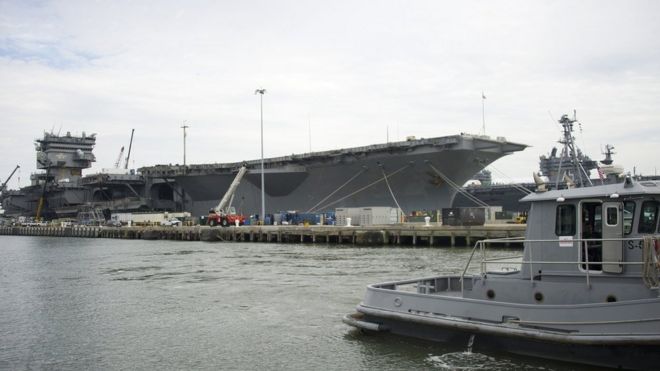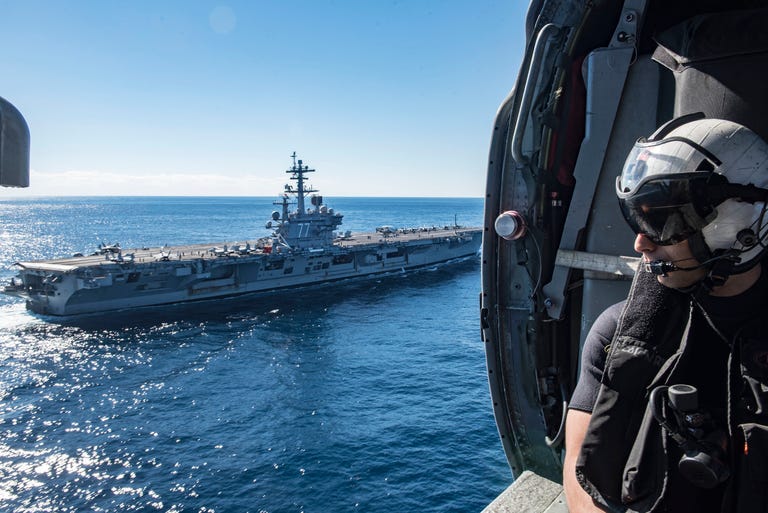Challenges On Land And At Sea
"...The return of Second Fleet helps re-energize NATO as a maritime force in the Atlantic. While I was supreme allied commander at NATO, the former NATO Atlantic command, or Saclant, had atrophied into a test bed for innovation and training and was a shadow of its former self."
"Alongside the return of Second Fleet, NATO has announced a new Atlantic Command as well, which will be embedded within the larger Second Fleet."
"Both will be based in Norfolk, Virginia, and the efficiencies of combining them will allow far better allied participation in U.S. military efforts in the Atlantic Ocean. Look for British, French, German, Italian, Spanish and other advanced warships from Europe to be calling in U.S. ports and operating extensively with American forces from the Arctic down to the Caribbean and well into the deep Atlantic."
"Both commands will be headed up by a single three-star vice-admiral, with staff officers from across the 29 nations of the NATO alliance."
James Stavridis, retired U.S. Navy admiral, former military commander, NATO
 |
| The Second Fleet will be based at its former home - Norfolk, Virginia Getty Images |
The world is divided as it always has been with regional and international challenges. In the far east, China is throwing its considerable weight around, claiming sole ownership of the South China Sea. U.S. allies in the area like Japan whose internationally recognized waters are now in dispute with China, suffer the indignity of watching while China builds artificial islands in the sea in disputed areas and builds military outposts there, claiming territory not its own but its de facto presence auguring permanent status for its claims.
The Chinese have become great tourists with their evolution from great poverty to a swelling middle class, eager to see the rest of the world and spread good cheer. Arriving in Vietnam as tourists, Chinese were ordered to remove the tee-shirts they were wearing, their printed legends declaring China's ownership of the South China Sea in a bid to make friends and influence people. Abroad, Chinese tourists have gained a reputation of arrogant entitlement, such that official China has cautioned them to tone it all down...
China has taken great interest in emerging territorial claims in the Arctic, claiming special status for itself, no doubt drawn both by opening shipping lanes due to climate change altering the pack ice, and with an eye to the vast undersea resources known to be present in the Arctic. China's outlier partner in the UN Security Council has also laid claims to the Arctic as an Arctic power, challenging Canada to its traditional oceanic Arctic territory. Both countries' assertiveness, influence and power make for uneasy international relations.
When the USSR collapsed, leaving satellite countries finally free to be themselves and the Russian Federation was left bereft of its former world power status built in threat and fear, the world exulted that peace would reign now that the Cold War had ended. The U.S., in view of the taut relations that have resulted between it and Moscow under the leadership of Vladimir Putin, has determined that its fleet in the Atlantic, dissolved in 2011 as a cost-saving measure, would be resurrected to guard the Atlantic approaches to the continental U.S.
 |
| The U.S. Navy, reacting to an increasingly active Russian Navy, will reactive the Second Fleet. U.S. Navy |
Close to 300 officers and enlisted men and women are due to be assigned to the Second Fleet for responsibilities linked to training the Atlantic Fleet and real-world operations tracking the presence of possibly hostile vessels on their approach to the U.S. coast. Predating this decision of the United States, Russia had rebuilt and re-equipped its Soviet-era Atlantic fleet with updated technology that included hypersonic cruise missiles and nuclear-powered undersea torpedoes.
Vladimir Putin's recent show-and-tell performance where he revealed in his "weapons video", the Russian military's new weapons was as much a crowing performance as it was a direct threat against American defences.
All of which has urged the U.S. forward to a new commitment to area surveillance and the use of oversea long-dwell drones, manned maritime patrol aircraft (Boeing's new P-8 Poseidon) meant to use undersea monitoring systems to track Russian submarines. These listening posts on the deep seabed are critical for advance notice of what is transpiring with the Russian navy.
At-sea combat training exercises with destroyers, cruisers and aircraft carriers while integrating land-based air both sides of the Atlantic from the U.S. U.K. and Iceland represent critical upgrades to the alliance's vigilance structure.
 |
| A screen grab shows a new Russian nuclear-powered submarine |
All of which is in reflection of the tensions existing between Washington and Moscow with Russian and American forces within shot of one another in Syria. The protocols signed between the U.S. and Russia (the 1972 Incidents at Sea agreements) have fallen into deliberate disuse. A series of close encounters at sea and in the air in the Baltic and Black Seas between the U.S. and Russian fleets highlight the need for response and deterrence, and to influence both sides to update the agreement and respect it in the higher interests of avoiding conflict.
 |
| Journalists watch as Russian President Vladimir Putin gives his annual state-of-the-nation address in Moscow on March 1. He calls the Kinzhal (Dagger) missile an "ideal weapon." (AP Photo) |
"[The U.S. has underestimated Russia's ability to mount a response, aiming for a] unilateral military advantage that could eventually allow it to dictate its terms in other areas."
"You [United States] will have to assess that new reality and become convinced that what I said today isn't a bluff. It's not a bluff, trust me."
"I want to tell all those who have fueled the arms race over the last 15 years, sought to win unilateral advantages over Russia, introduced unlawful restrictions and sanctions aimed to contain our country's development: All what you wanted to impede with your policies has now happened. You have failed to contain Russia."
"[The weapon -- an intercontinental hypersonic missile that would fly at 20 times the speed of sound and strike its targets] like a meteorite, like a fireball [is capable of performing sharp manoeuvres on its way to targets, making it] absolutely invulnerable for any missile defence system."
Russian President Vladimir Putin
Labels: Atlantic, Russia, Second Fleet, Threats NATO, United States

<< Home